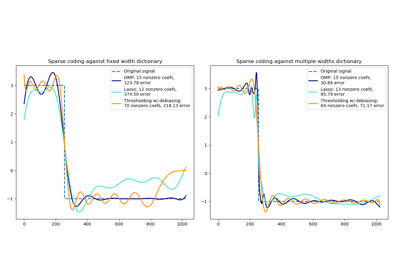sklearn.decomposition.SparseCoder¶
-
class
sklearn.decomposition.SparseCoder(dictionary, transform_algorithm='omp', transform_n_nonzero_coefs=None, transform_alpha=None, split_sign=False, n_jobs=None, positive_code=False, transform_max_iter=1000)[source]¶ Sparse coding
Finds a sparse representation of data against a fixed, precomputed dictionary.
Each row of the result is the solution to a sparse coding problem. The goal is to find a sparse array
codesuch that:X ~= code * dictionary
Read more in the User Guide.
- Parameters
- dictionaryarray, [n_components, n_features]
The dictionary atoms used for sparse coding. Lines are assumed to be normalized to unit norm.
- transform_algorithm{‘lasso_lars’, ‘lasso_cd’, ‘lars’, ‘omp’, ‘threshold’}, default=’omp’
Algorithm used to transform the data: lars: uses the least angle regression method (linear_model.lars_path) lasso_lars: uses Lars to compute the Lasso solution lasso_cd: uses the coordinate descent method to compute the Lasso solution (linear_model.Lasso). lasso_lars will be faster if the estimated components are sparse. omp: uses orthogonal matching pursuit to estimate the sparse solution threshold: squashes to zero all coefficients less than alpha from the projection
dictionary * X'- transform_n_nonzero_coefsint, default=0.1*n_features
Number of nonzero coefficients to target in each column of the solution. This is only used by
algorithm='lars'andalgorithm='omp'and is overridden byalphain theompcase.- transform_alphafloat, default=1.
If
algorithm='lasso_lars'oralgorithm='lasso_cd',alphais the penalty applied to the L1 norm. Ifalgorithm='threshold',alphais the absolute value of the threshold below which coefficients will be squashed to zero. Ifalgorithm='omp',alphais the tolerance parameter: the value of the reconstruction error targeted. In this case, it overridesn_nonzero_coefs.- split_signbool, default=False
Whether to split the sparse feature vector into the concatenation of its negative part and its positive part. This can improve the performance of downstream classifiers.
- n_jobsint or None, default=None
Number of parallel jobs to run.
Nonemeans 1 unless in ajoblib.parallel_backendcontext.-1means using all processors. See Glossary for more details.- positive_codebool, default=False
Whether to enforce positivity when finding the code.
New in version 0.20.
- transform_max_iterint, default=1000
Maximum number of iterations to perform if
algorithm='lasso_cd'orlasso_lars.New in version 0.22.
- Attributes
- components_array, [n_components, n_features]
The unchanged dictionary atoms
Methods
fit(self, X[, y])Do nothing and return the estimator unchanged
fit_transform(self, X[, y])Fit to data, then transform it.
get_params(self[, deep])Get parameters for this estimator.
set_params(self, \*\*params)Set the parameters of this estimator.
transform(self, X)Encode the data as a sparse combination of the dictionary atoms.
-
__init__(self, dictionary, transform_algorithm='omp', transform_n_nonzero_coefs=None, transform_alpha=None, split_sign=False, n_jobs=None, positive_code=False, transform_max_iter=1000)[source]¶ Initialize self. See help(type(self)) for accurate signature.
-
fit(self, X, y=None)[source]¶ Do nothing and return the estimator unchanged
This method is just there to implement the usual API and hence work in pipelines.
- Parameters
- XIgnored
- yIgnored
- Returns
- selfobject
Returns the object itself
-
fit_transform(self, X, y=None, **fit_params)[source]¶ Fit to data, then transform it.
Fits transformer to X and y with optional parameters fit_params and returns a transformed version of X.
- Parameters
- Xnumpy array of shape [n_samples, n_features]
Training set.
- ynumpy array of shape [n_samples]
Target values.
- **fit_paramsdict
Additional fit parameters.
- Returns
- X_newnumpy array of shape [n_samples, n_features_new]
Transformed array.
-
get_params(self, deep=True)[source]¶ Get parameters for this estimator.
- Parameters
- deepbool, default=True
If True, will return the parameters for this estimator and contained subobjects that are estimators.
- Returns
- paramsmapping of string to any
Parameter names mapped to their values.
-
set_params(self, **params)[source]¶ Set the parameters of this estimator.
The method works on simple estimators as well as on nested objects (such as pipelines). The latter have parameters of the form
<component>__<parameter>so that it’s possible to update each component of a nested object.- Parameters
- **paramsdict
Estimator parameters.
- Returns
- selfobject
Estimator instance.
-
transform(self, X)[source]¶ Encode the data as a sparse combination of the dictionary atoms.
Coding method is determined by the object parameter
transform_algorithm.- Parameters
- Xarray of shape (n_samples, n_features)
Test data to be transformed, must have the same number of features as the data used to train the model.
- Returns
- X_newarray, shape (n_samples, n_components)
Transformed data

